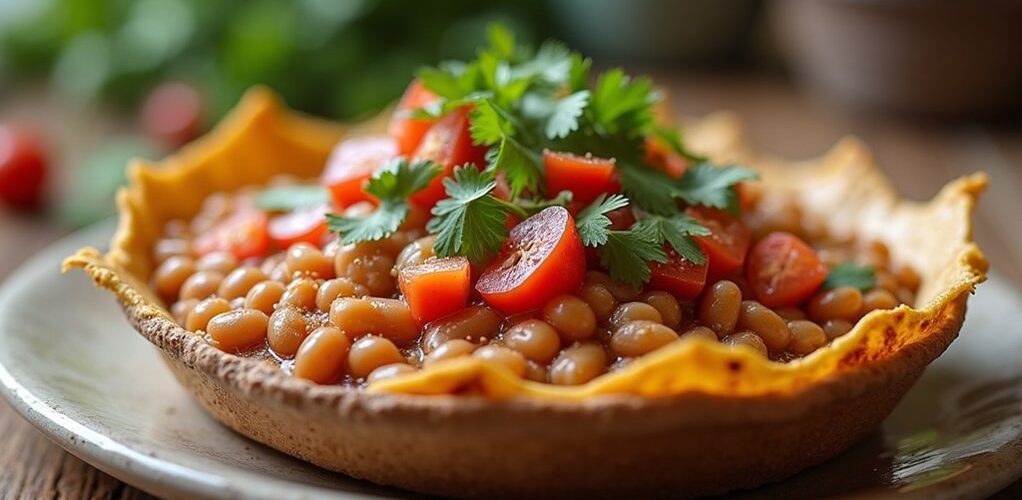
Refried beans are not considered low-carb, containing approximately 32 grams of total carbohydrates per cup serving. While their high fiber content of 14 grams reduces the net carb count to 26 grams, this amount still exceeds typical low-carb diet limits. However, alternatives like black soybeans offer similar texture and flavor with just 1 gram of net carbs per serving. Understanding these options and proper portion control can help incorporate refried beans into a carb-conscious lifestyle.
Key Takeaways
- Traditional refried beans are not low-carb, containing 32g total carbohydrates and 26g net carbs per cup serving.
- A typical serving of refried beans provides 20-25 grams of carbohydrates, making them challenging for low-carb diets.
- Black soybeans offer a low-carb alternative with only 1g net carbs per serving for making keto-friendly refried beans.
- Small portions of 2-3 tablespoons can help fit refried beans into a low-carb diet while maintaining restrictions.
- Adding non-starchy vegetables like eggplant to homemade refried beans can reduce the overall carb content significantly.
Understanding the Carb Content in Refried Beans
While refried beans are a staple in many cuisines and offer significant nutritional benefits, their carbohydrate content requires careful consideration for those following a low-carb lifestyle.
A single cup of refried beans contains approximately 32g of total carbohydrates, with net carbs reaching 26g after fiber deduction, making them a distinctly high carb food choice.
Though refried beans are a good source of protein and dietary fiber, their high carbohydrate content can pose challenges for individuals adhering to strict low-carb or ketogenic diets.
Understanding and monitoring carb intake becomes essential when incorporating refried beans into meal plans, as a typical serving contains 20-25 grams of carbohydrates, which may exceed daily carb limits for those following restricted dietary protocols.
The Role of Fiber and Net Carbs
When evaluating the nutritional value of refried beans, it's vital to take into account their high fiber content, which greatly impacts the net carb calculation. While a cup of refried beans contains approximately 40g of total carbohydrates, the presence of 14g of dietary fiber reduces the net carb count to 26g per serving. This considerable fiber content not only supports digestive health but also contributes to weight management by promoting satiety. For those following a low carb lifestyle, understanding the relationship between total carbs and fiber helps in making informed decisions about incorporating beans into their meal plans, particularly when working within specific carb count limits. Additionally, protein intake should be monitored to ensure nutritional balance and support muscle maintenance, which is important for anyone managing their carb intake.
Making Keto-Friendly Refried Beans at Home
Many health-conscious individuals can create satisfying keto-friendly refried beans at home using black soybeans as a low-carb alternative to traditional legumes. With just 1g of net carbs per serving, canned black soybeans provide an excellent foundation for this Mexican-inspired dish.
The preparation begins by creating a flavorful base, sautéing onions and garlic until aromatic before incorporating the beans and essential spices. For a boost of flavor and healthy fats, consider adding avocado oil during the sautéing process.
For enhanced creaminess and volume, roasted eggplant can be blended into the mixture. Cooks can adjust consistency through varying simmer times after pureeing, achieving their desired texture.
These keto-friendly refried beans work well for quick meals and can be stored in the refrigerator for up to five days, or frozen for six months, ensuring a convenient low-carb option is always available.
Best Practices for Enjoying Refried Beans on Low-Carb Diets
Successfully incorporating refried beans into a low-carb diet requires careful attention to portion sizes and strategic meal planning. When monitoring portion sizes, aim to limit servings to 2-3 tablespoons as a side dish to maintain carb restrictions while still enjoying the flavor and texture of refried beans. For those following strict low-carb diets, modifying standard recipes offers practical solutions. Using canned black soybeans as a base ingredient considerably reduces carb content while maintaining the traditional taste. Adding non-starchy vegetables like eggplant to recipes can further decrease the overall carbohydrate load. It's important to steer clear of starchy vegetables like potatoes that can quickly raise carb intake and disrupt ketosis. Those following cyclical or targeted ketogenic approaches have more flexibility, allowing for strategic consumption of traditional refried beans during designated carb-loading periods or around workout sessions.
Nutritional Benefits Beyond the Carb Count
Understanding refried beans' nutritional profile reveals benefits that extend far beyond their carbohydrate content. Health experts emphasize that whether preparing a refried beans recipe at home or using canned beans, they serve as an excellent source of protein, delivering about 14 grams per cup. The benefits of refried beans include substantial amounts of dietary fiber and essential minerals, particularly when prepared with heart-healthy olive oil instead of traditional lard. Beyond their protein content, black beans and other varieties used in refried preparations offer impressive nutritional benefits, including high levels of iron, magnesium, and potassium. Their antioxidant-rich profile, combined with a low glycemic index, makes them a valuable addition to a low carb lifestyle, supporting both blood sugar management and long-term health maintenance. Incorporating foods with a low glycemic index is crucial for maintaining steady blood sugar levels, which is beneficial for individuals managing type 2 diabetes.
Smart Substitutions and Alternatives
Several effective substitutions enable individuals following low-carb diets to enjoy the rich, satisfying taste of refried beans while maintaining their dietary goals. For those seeking alternatives to traditional pinto beans, canned black soybeans offer a noticeably lower carb content while preserving the familiar texture and consistency of homemade refried beans. Replace traditional pinto beans with black soybeans, adding olive oil and low-salt seasonings. Create keto-friendly versions using mashed eggplant or cauliflower as the base. Enhance flavor profiles with spices like cumin and chili powder while keeping carbs minimal. Eggs are an excellent low-carb and high-protein option, with less than 1 gram of carbs per large egg, making them a great addition to keto-friendly refried bean recipes. When preparing substitutes for traditional refried beans, focusing on proper seasoning and preparation techniques helps maintain authentic taste while accommodating low-carb and keto diet requirements. These alternatives provide satisfying options without compromising dietary goals.
Frequently Asked Questions
Are Refried Beans Ok on a Low Carb Diet?
Refried beans aren't ideal for low-carb diets due to their high carbohydrate content of 40g per cup. Consider black soybeans as a lower-carb alternative when planning meals requiring traditional bean dishes.
Will Refried Beans Kick Me Out of Ketosis?
Refried beans' high carb content can disrupt ketosis effects, as one cup contains 26g net carbs. For keto-friendly recipes, consider bean alternatives like black soybeans while monitoring portion control and meal planning.
What Is a Serving Size of Refried Beans?
A standard serving size of refried beans is one cup (238 grams), providing 236 calories and 14 grams of dietary fiber. Portion control varies by bean types and cooking methods for ideal nutritional value.
Can You Eat Refried Beans on Slow Carb Diet?
Refried beans can fit into a slow carb diet when portion control is maintained. Their fiber content and protein benefits outweigh concerns, though dieters should consider alternative beans or smaller servings for ideal health results.
Conclusion
While traditional refried beans may not align perfectly with strict low-carb diets, they can still fit into a moderately low-carb eating plan when portion sizes are carefully managed. Their fiber content, protein, and essential nutrients make them a worthwhile consideration for those following a flexible approach. For stricter low-carb needs, alternatives like cauliflower-based versions offer similar textures and flavors while maintaining ketogenic requirements. Understanding net carbs and making informed choices allows for responsible incorporation of this nutritious food.









No Comments